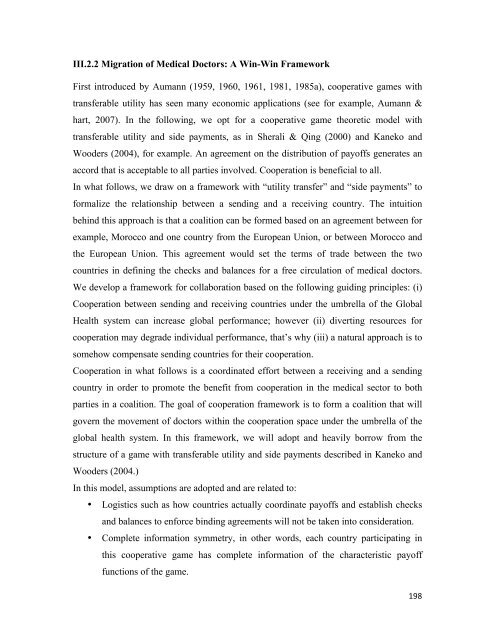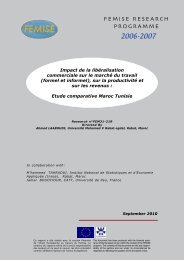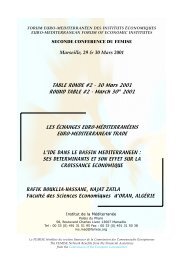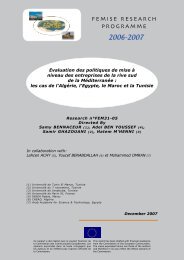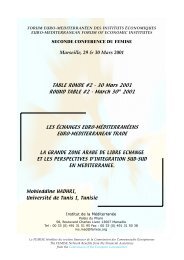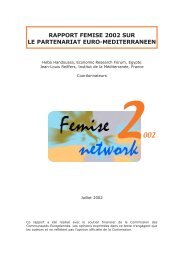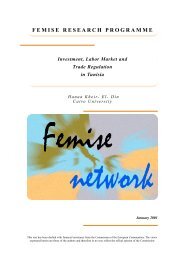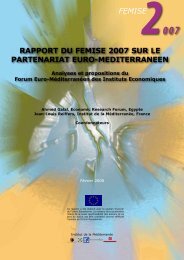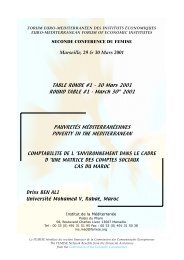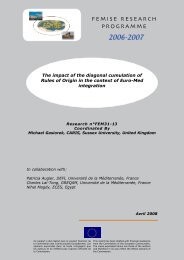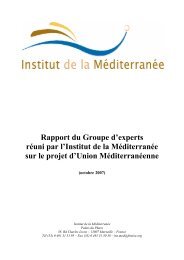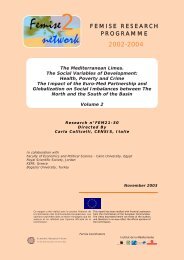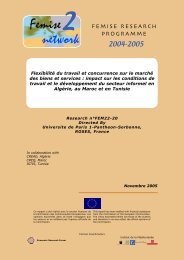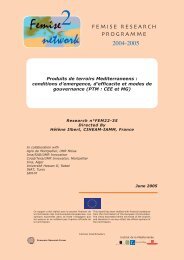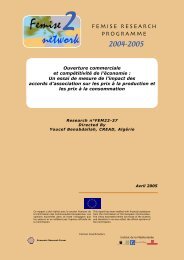Download the report - Femise
Download the report - Femise
Download the report - Femise
You also want an ePaper? Increase the reach of your titles
YUMPU automatically turns print PDFs into web optimized ePapers that Google loves.
III.2.2 Migration of Medical Doctors: A Win-Win Framework<br />
First introduced by Aumann (1959, 1960, 1961, 1981, 1985a), cooperative games with<br />
transferable utility has seen many economic applications (see for example, Aumann &<br />
hart, 2007). In <strong>the</strong> following, we opt for a cooperative game <strong>the</strong>oretic model with<br />
transferable utility and side payments, as in Sherali & Qing (2000) and Kaneko and<br />
Wooders (2004), for example. An agreement on <strong>the</strong> distribution of payoffs generates an<br />
accord that is acceptable to all parties involved. Cooperation is beneficial to all.<br />
In what follows, we draw on a framework with “utility transfer” and “side payments” to<br />
formalize <strong>the</strong> relationship between a sending and a receiving country. The intuition<br />
behind this approach is that a coalition can be formed based on an agreement between for<br />
example, Morocco and one country from <strong>the</strong> European Union, or between Morocco and<br />
<strong>the</strong> European Union. This agreement would set <strong>the</strong> terms of trade between <strong>the</strong> two<br />
countries in defining <strong>the</strong> checks and balances for a free circulation of medical doctors.<br />
We develop a framework for collaboration based on <strong>the</strong> following guiding principles: (i)<br />
Cooperation between sending and receiving countries under <strong>the</strong> umbrella of <strong>the</strong> Global<br />
Health system can increase global performance; however (ii) diverting resources for<br />
cooperation may degrade individual performance, that’s why (iii) a natural approach is to<br />
somehow compensate sending countries for <strong>the</strong>ir cooperation.<br />
Cooperation in what follows is a coordinated effort between a receiving and a sending<br />
country in order to promote <strong>the</strong> benefit from cooperation in <strong>the</strong> medical sector to both<br />
parties in a coalition. The goal of cooperation framework is to form a coalition that will<br />
govern <strong>the</strong> movement of doctors within <strong>the</strong> cooperation space under <strong>the</strong> umbrella of <strong>the</strong><br />
global health system. In this framework, we will adopt and heavily borrow from <strong>the</strong><br />
structure of a game with transferable utility and side payments described in Kaneko and<br />
Wooders (2004.)<br />
In this model, assumptions are adopted and are related to:<br />
• Logistics such as how countries actually coordinate payoffs and establish checks<br />
and balances to enforce binding agreements will not be taken into consideration.<br />
• Complete information symmetry, in o<strong>the</strong>r words, each country participating in<br />
this cooperative game has complete information of <strong>the</strong> characteristic payoff<br />
functions of <strong>the</strong> game.<br />
! *)(!


